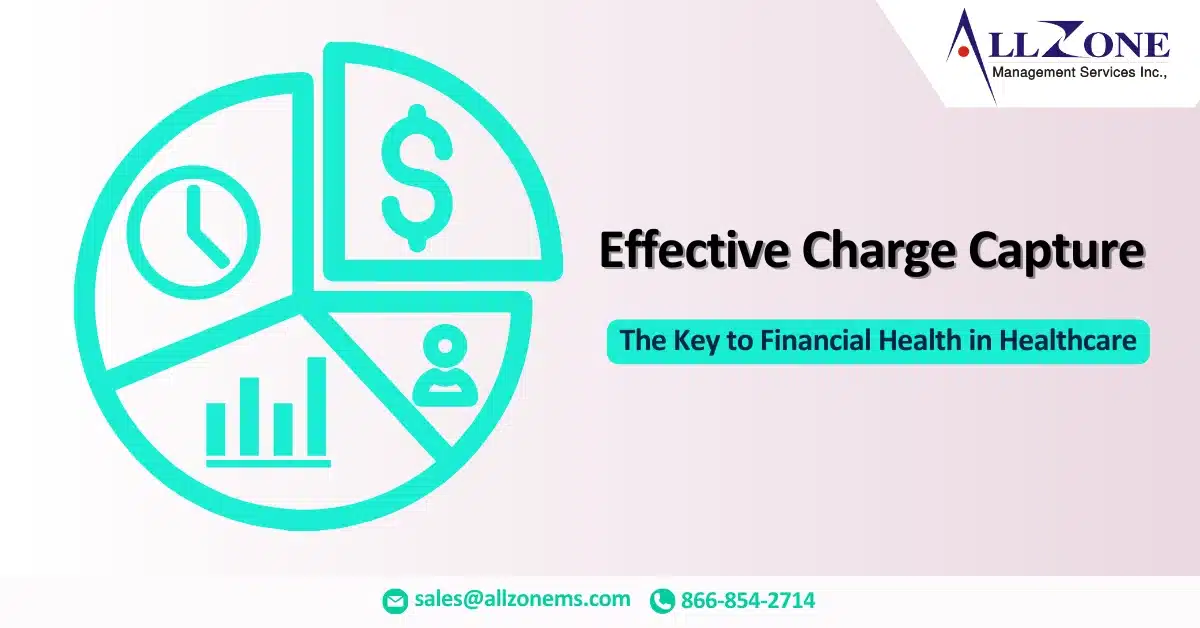Charge Capture in Healthcare, a critical component of the revenue cycle management process, involves the accurate and timely documentation of all services rendered to patients. This includes procedures, tests, medications, and other healthcare services. While it may seem like a simple task, effective healthcare charge capture is essential to ensure optimal revenue cycle performance and financial health for healthcare organizations.
Understanding the Importance of Charge Capture
Accurate Billing and Claims Submission:
-
- Complete and Accurate Claims: Well-captured charges lead to complete and accurate claims, reducing the likelihood of claim denials and rejections.
- Faster Claim Processing: Accurate claims are processed more quickly, accelerating reimbursement timelines.
Maximized Revenue:
-
- No Lost Revenue: By capturing all billable services, healthcare providers avoid losing potential revenue.
- Increased Revenue: Proper charge capture helps identify additional billable services that might have been overlooked.
Improved Financial Performance:
-
- Stronger Financial Position: Timely and accurate revenue collection strengthens the financial position of healthcare organizations.
- Better Cash Flow: Efficient charge capture improves cash flow by reducing delays in reimbursement.
Enhanced Compliance and Risk Mitigation:
-
- Adherence to Regulations: Accurate charge capture helps ensure compliance with complex healthcare regulations, such as HIPAA and coding guidelines.
- Reduced Audit Risk: Well-documented charges minimize the risk of audits and potential penalties.
Challenges in healthcare Charge capture
Despite its importance, healthcare organizations often face challenges in implementing effective charge capture processes. Some common challenges include:
-
- Complex Coding and Billing Rules: The evolving healthcare landscape and frequent changes in coding and billing regulations can make healthcare Charge capture a complex task.
- Human Error: Manual charge capture processes are prone to human error, leading to inaccurate or incomplete claims.
- Time Constraints: Busy healthcare providers may not have sufficient time to accurately document all services rendered.
- Lack of Standardization: Inconsistent documentation practices can hinder efficient charge capture.
Strategies for Effective Charge Capture
To overcome these challenges and optimize charge capture, healthcare organizations can implement the following strategies:
Robust Charge Capture Policies and Procedures:
-
- Clear Guidelines: Develop clear and concise policies and procedures for healthcare Charge capture charge capture, including documentation standards, coding guidelines, and billing protocols.
- Regular Training: Provide regular training to healthcare providers and staff on charge capture best practices and updates to coding and billing regulations.
Advanced Charge Capture Technologies:
-
- Electronic Health Records (EHRs): Utilize EHRs with built-in charge capture features to automate the process and reduce manual effort.
- Charge Capture Software: Implement specialized charge capture software to streamline the process and improve accuracy.
Real-Time Charge Capture:
-
- Point-of-Service (POS) Capture: Capture charges at the point of service, such as during patient encounters or procedures.
- Automated Charge Capture: Use automated tools to capture charges based on clinical documentation and billing rules.
Regular Audits and Monitoring:
-
- Periodic Reviews: Conduct regular audits of Charge capture processes to identify and address any issues or discrepancies.
- Performance Metrics: Monitor key performance indicators (KPIs) related to charge capture, such as claim denial rates and reimbursement timelines.
Collaboration Between Clinical and Billing Teams:
-
- Effective Communication: Foster strong communication between clinical and billing teams to ensure accurate and timely charge capture.
- Joint Efforts: Collaborate on initiatives to improve charge capture processes and address any challenges.
Conclusion:
Effective charge capture is a cornerstone of revenue cycle success. By prioritizing accurate and timely documentation, healthcare organizations can optimize revenue, improve financial performance, and mitigate risks. By implementing robust policies, leveraging advanced technologies, and fostering strong collaboration, healthcare providers can achieve optimal charge capture and ensure the financial health of their organizations.

